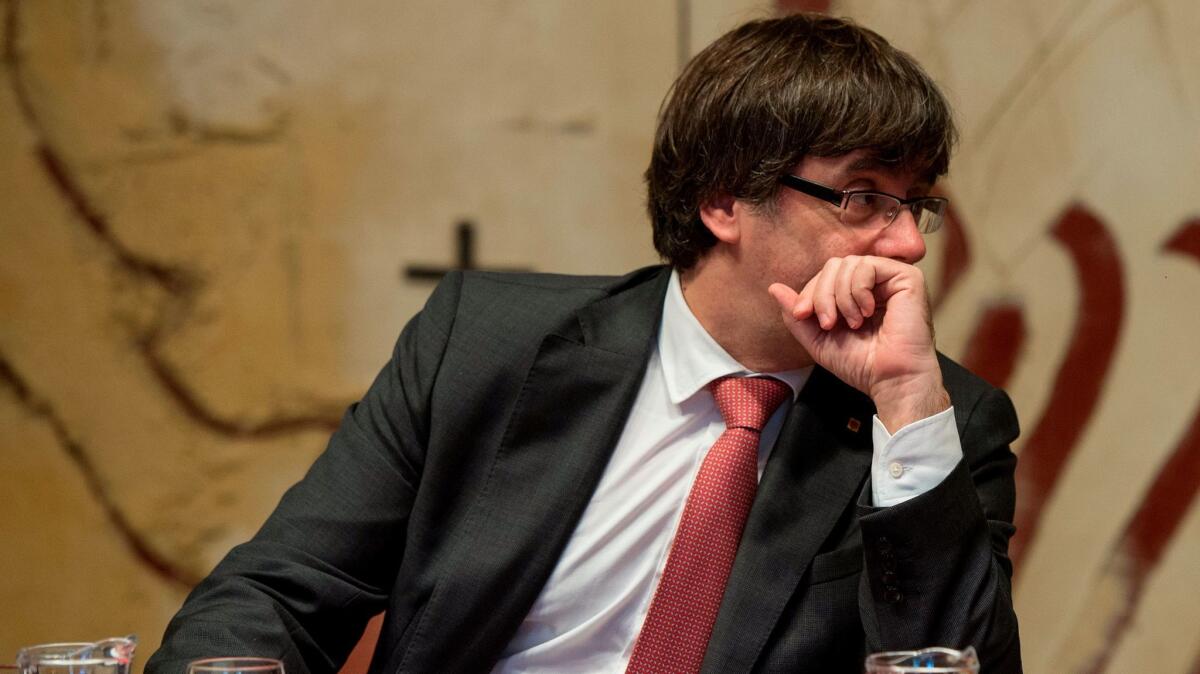Catalan separatist leader calls for peaceful resistance to Spain takeover

- Share via
Reporting from Barcelona, Spain — Catalan separatist leader Carles Puigdemont called Saturday for peaceful resistance to direct rule by Madrid, a day after Spain’s central government fired him and dissolved his government in response to Catalonia’s unilateral declaration of independence.
The Madrid government, meanwhile, began implementing its administrative takeover of Catalonia, the first such imposition of direct central rule in a Spanish region since the advent of democracy nearly 40 years ago.
Puigdemont, in a brief prerecorded statement shown on Catalan public TV, called for resistance to Spanish Prime Minister Mariano Rajoy’s directives, but offered no specifics about his own situation.
“It’s very clear that the best form of defending gains made up until now is democratic opposition to Article 155,” Puigdemont said, referring to the constitutional provision that Madrid invoked in response to the region’s independence drive.
The article gives the Spanish central government the authority to strip a region of its autonomous powers in the event of a serious breach of law. Catalonia, like other Spanish regions, was granted autonomy powers under the 1979 constitution that gave it limited control over its own affairs.
The mood in Barcelona, Catalonia’s capital, was largely calm Saturday, following a night of raucous street celebrations — and some scattered violence — after the Catalan parliament’s vote to break away from Spain. Local police patrolled busy tourist areas near the Catalan parliament and government buildings, where hundreds of tourists mixed with independentistas in the mild afternoon sun.
In Madrid, thousands flooded a central plaza for a pro-unity rally, waving Spanish flags and chanting that Spain must remain undivided. There were shows of anti-secessionist sentiment in Barcelona, too, though on a relatively small scale.
“Long live Spain!” a man in a red shirt and bicycle shorts shouted as he pushed his bicycle past a crowd in front of the main Catalan administrative building.
Spain put its deputy prime minister, Soraya Saenz de Santamaria, in charge of day-to-day affairs in Catalonia. She has been a forceful advocate of the central government’s stance that Catalan separatists acted illegally and that the independence votes — both in parliament on Friday and a referendum held Oct. 1 — are invalid.
There was widespread uncertainty over how the Spanish takeover will play out. The start of the work week on Monday will yield clues as to how the region’s 200,000 civil servants will respond; some have already declared they will not obey directives from the central government. One of Catalonia’s largest unions has called a 10-day general strike starting Monday in support of independence.
Another unknown was whether separatist lawmakers would be allowed to stand for parliamentary seats in the regional elections that Rajoy set for Dec. 21.
Polls have suggested that Catalonia’s people are split roughly equally on the independence question. The separatist side overwhelmingly prevailed in the Oct. 1 referendum, but less than half the electorate voted after the central government urged people to shun the balloting.
The opposition also boycotted Friday’s parliamentary vote.
Pro-independence politicians struck a defiant tone Saturday. Albano-Dante Fachin of the secessionist Podemos party suggested in an interview on Catalan radio that the independence camp would refuse to take part in the Spanish-mandated balloting.
On the anti-secession side, the head of the Ciudadanos party in Catalonia, Albert Rivera, urged backers to take part in the Dec. 21 vote.
“We had a sad day yesterday, but we also saw the application of the law and the constitution,” he said. “Our country is headed in the right direction.”
As part of its effort to bring the secessionists to heel, the central government is seeking to further isolate Catalonia internationally, dismantling the region’s informal embassies in Europe and elsewhere. No country has offered recognition of the independence declaration.
The Trump administration on Friday offered support for the Madrid government, a NATO ally, saying that Catalonia is an integral part of Spain. Europe, too, has sharply rejected the independence declaration.
The European Commission’s president, Jean-Claude Juncker, called Saturday for respect for Spain’s constitutional order.
Twenty-four hours after the parliament’s independence vote, secessionists were still expressing happiness, but said they didn’t know what might happen next.
“No one knows,” said Pilar Morer, 70. “This is a hard time.”
Her father, a Republican, had been jailed in France under dictator Gen. Francisco Franco, and as a girl she had been forbidden from speaking Catalan in public, only daring to use her native language secretly inside her home.
“Our fathers, our grandfathers, have been fighting for this,” she said. “We endure.”
Barcelona street vendor Jose Manuel went about his business as usual, selling magazines, selfie sticks, and hats to passing tourists — an endeavor that earns him 450 euros, or about $520, a month. While he said he believed in Catalonia’s right to be independent, he worried about a potential currency change.
“It’s a big problem, the money,” he said, before hurrying to attend to a customer.
Times staff writers Hennessy-Fiske reported from Barcelona and King from Washington. Staff writer Meg Bernhard contributed from Barcelona.
More to Read
Sign up for Essential California
The most important California stories and recommendations in your inbox every morning.
You may occasionally receive promotional content from the Los Angeles Times.











